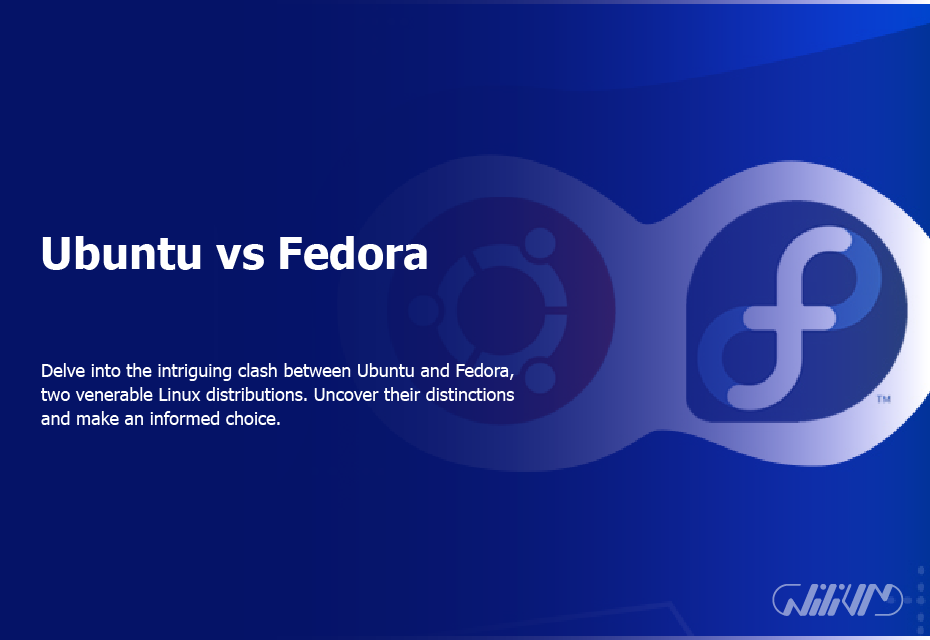Ubuntu VS Fedora
Two names stand out, particularly in the field of Linux operating systems: Ubuntu and Fedora. Both of these distributions have devoted users and excellent features, but they serve significantly distinct niches. In this post, we’ll examine the particulars of Ubuntu and Fedora, contrasting their capabilities, usability, and community support. By the conclusion, you’ll know more about which distribution would be the most appropriate for you.

Contents
Understanding Ubuntu
One of the most well-liked Linux distributions is Ubuntu, which is renowned for its approachable user interface and broad community support. It includes many variations, each designed for a certain use, such as Ubuntu Desktop, Ubuntu Server, and Ubuntu Core. Ubuntu is an excellent option for consumers switching from other operating systems since it is intended to be accessible for both novice and expert users.
Catch the Debate: Ubuntu vs Fedora! Elevate Your Experience – Buy Linux VPS .
Exploring Fedora
Fedora, on the other hand, focuses a big emphasis on cutting-edge technology and open-source applications. It acts as a trial run for new ideas that often find their way into other Linux variants later. To meet the requirements and tastes of diverse users, Fedora provides numerous “spins” and editions. Fedora could be a better option if you’re a developer or enthusiast wishing to work with the newest software.
Performance and Stability
Long-Term Support (LTS) editions of Ubuntu are well known for their dependability and stability. These versions are perfect for use in production settings since they continue to get security upgrades and bug fixes. Fedora’s regular releases, in comparison, provide the most recent improvements and features but may not be as stable as Ubuntu’s LTS versions.
Package Management
Package managers are used by Fedora and Ubuntu to manage and install applications. Fedora utilizes the Red Hat package manager (DNF), while Ubuntu uses the Debian package manager (APT). Although both distributions’ package management processes are typically simple, Ubuntu’s Software Center may provide a little more streamlined user experience.
Desktop Environments
The default desktop environment for Ubuntu is GNOME, which has a simple and clear user interface. Although Fedora is renowned for its dedication to providing a variety of desktop environments, it also includes GNOME. By selecting among KDE Plasma, Xfce, and other options, you can simply personalize your experience with Fedora.
Community and Support
Ubuntu has a large and vibrant user community, including forums and tools to assist users in problem-solving. Additionally, Fedora has a robust community with active communication channels and a dedication to teamwork. Your preference for a certain kind of community participation may influence which of the two you choose.
Security Features
Fedora has a strict security policy and incorporates tools like SELinux to improve system security. While Ubuntu has many security measures, it may take a more user-oriented approach to security, balancing user enjoyment with safety.
Software Availability
Both beginner and expert users can find a large variety of apps in Ubuntu’s Software Center. Due to Fedora’s tight adherence to the open-source philosophy, certain proprietary software may not be easily accessible in its repository. To fill this gap, you may often locate third-party repositories.
Use Cases
For those looking for a seamless and trouble-free move from another operating system, Ubuntu is a great option. For companies and organizations that place a high priority on reliability, its LTS releases are very helpful. Developers, hobbyists, and those who wish to work with cutting-edge software can benefit from Fedora.
Comparing User Experience
Ubuntu is a pleasant option for newbies because of its user-friendly design and thorough documentation. On the other side, Fedora’s dedication to cutting-edge technology can attract people who are interested in using cutting-edge capabilities.
Updates and Release Cycle
With LTS releases every two years, Ubuntu has a predictable release schedule that guarantees a reliable platform for extended periods. Fedora releases often, keeping the distribution abreast of new developments, but this might shorten the support period for each version.
System Requirements
Due to their modest system requirements, Fedora and Ubuntu can run on a variety of hardware. In terms of system resources, Ubuntu is often a little more forgiving, although Fedora’s performance may be enhanced by more powerful hardware.
Multimedia and Proprietary Software
Ubuntu has a more lenient attitude to commercial software and multimedia support, making it simpler to install multimedia codecs and proprietary drivers. Due to Fedora’s emphasis on open source, certain multimedia functions may take a little extra work to activate.
Conclusion
Ubuntu and Fedora are two popular Linux distributions, and picking one over the other comes down to personal choice. Ubuntu’s LTS versions are excellent options if you care about reliability and usability. However, Fedora’s frequent releases may be more enticing if you are an enthusiast who enjoys tinkering with cutting-edge technology. Ubuntu and Fedora are two solid Linux distributions from which to start your adventure.
FAQs
Can I switch from Ubuntu to Fedora easily?
Yes, switching between these distributions is possible. However, it's recommended to back up your data before making any changes.
Which distribution is more stable, Ubuntu or Fedora?
Ubuntu's LTS releases are known for their stability, making Ubuntu a more stable option compared to Fedora's regular releases.
Does Fedora support proprietary software?
Fedora's commitment to open-source software means it has a stricter stance on proprietary software. However, you can often find third-party repositories that offer such software.
Can I get professional support for both Ubuntu and Fedora?
Yes, both distributions offer professional support options, but Ubuntu's larger user base might translate to more available support resources.







